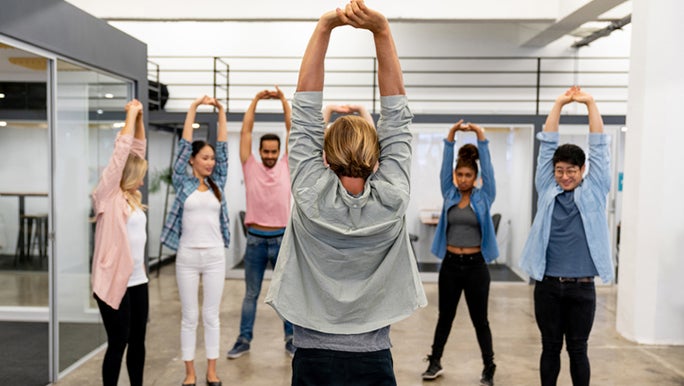Key Points
- Mindfulness Monday is gaining popularity in workplaces
- Research suggests mindfulness at work may have a variety of benefits
- Mindful Monday can be an excellent culture-building activity
Meatless Mondays is a trend that has caught on in many households over the years. Maybe the alliteration has something to do with it – the two ‘Ms’ roll off the tongue and make the concept easier to remember. Now a workplace wellness practice is growing in popularity: Mindfulness Mondays.
Why? Well, we know that people generally spend most of their day at work, so making a point of setting our intentions at the start of each week might make our experiences there more pleasant – and maybe even more productive.
We spoke to Health Psychologist and healthylife Advisory Board member Dr Moira Junge about why adopting a Mindful Monday approach might be a good idea for your workplace.
How to be mindful
So, what is mindfulness? It stems from Buddhist meditation traditions, and was popularised in the West in 1979 by Jon Kabat-Zinn.
The goal? To help people focus on the present without distraction or judgement.
Contrary to popular belief, mindfulness practice isn’t necessarily about having a quiet mind. It’s more about just observing the moment you are in at any given time.
“I think engaging in mindfulness at work is a fantastic thing,” Dr Moira says. “I just love that it can set you up for your week in acceptance, trust and patience.”

Studies suggest workplace mindfulness may help reduce burnout and improve team and individual performance
What are the benefits of a Mindful Monday?
Practising mindfulness in workplaces is by no means a new concept. Tech companies, universities, the health industry and schools have all introduced it in varying forms.
Launched in 2017, the Melbourne-based Smiling Mind programs and apps have brought mindfulness to many schools and workplaces. To date, one-third of Australian educators have used the programs and 8.6 million young people have been reached globally.
A 2017 report termed the growing movement to bring mindfulness into the workplace as ‘contemplative management’ – an exciting new area of leadership.
While the report noted combining working or ‘doing’ with mindfulness or ‘being’ isn’t always easy, it has been shown to have positive impacts, such as reducing mild stress and improving work performance.
Enter the concept of a Mindfulness Monday. While the idea of implementing mindfulness five days a week at work might be a bit of a stretch, just focusing on it for one day – or even part of the day on a Monday – is more achievable.
“The great thing about this practice is you can just focus on it for one day, and hopefully it’ll scatter across the rest of the week,” Dr Moira says.
Preliminary studies suggest that workplace mindfulness may help:
- reduce burnout
- increase wellbeing
- improve team and individual performance
It’s important to note that further research is needed to help support these results.
Dr Moira believes workplace mindfulness shouldn’t be limited to the team environment, as it may be a good tool for relationship building throughout the local community.
“Think about ways to spread it out to other people in the community,” she says. “Host a Mindful Monday event that people can come to, or join forces with someone you collaborate with already.”

Mindfulness Mondays can involve a shared lunch with no devices present
How to practise Mindful Mondays
Dr Moira suggests that workplace Mindful Mondays may work better if there’s a passionate individual championing the cause.
“You need to have a good advocate – someone who explains the initiative well, monitors it, evaluates it, keeps checking in with people, gets feedback and then tailors it to what people actually want,” she says.
If you’re thinking about starting Mindfulness Monday in your workplace, Dr Moira suggests keeping it simple:
- meet in an outside space for Monday meetings and try to include movement
- if you can, create a dedicated space that incorporates elements of nature, essential oils, natural materials and water sounds
- try a group meditation
- have a mindful eating lunch hour as a group, without devices
Dr Moira speaks highly of a practice she has used personally in the workplace, called ‘five magic breaths’.
“We all sat in the meeting or on Zoom and did five magic breaths,” she says. “It was just breathing, but it was so powerful. I remember being nervous sometimes when I had to present at a meeting. I’d do the five magic breaths and it was really great. It made a big difference.”
And don’t forget to familiarise yourself with the easiest mindfulness exercise around: five senses mindfulness. In this Mindful Monday activity, name five things you can see, four things you can feel, three things you can hear, two things you can smell and one thing you can taste. In doing so, you’ll focus on these thoughts, bringing a sense of calm and tranquility to your mind while helping to clear any anxious or racing thoughts.
What not to do
When introducing Mindful Monday to your team, try to avoid making it a mandatory or expected activity.
“Mindfulness isn’t something everyone is going to want to take part in,” Dr Moira says. “Make sure that for those who don’t want to do it, there’s respect for their decision to opt-out.”

There are many ways to practice Mindfulness Mondays at work
Breathe in, breathe out
Adopting mindfulness strategies like Mindful Monday in your workplace can seem like a challenge at first, but the evidence is showing it’s definitely worth a try.
Whether you’re simply sitting in a circle with your eyes closed and listening to soothing ocean sounds before the work week begins, doing some simple stretches together or heading up a company-wide mindfulness strategy to help combat workplace burnout, research suggests there may be a range of benefits.
If you need more help or support with mental health, please see your healthcare professional. You can also visit Beyond Blue for additional resources.
Related:
Dr Moira Junge, a healthylife Advisory Board member, is a registered, practising health psychologist with the added specialty of sleep. She has been in private practice for over 20 years and is the CEO of the Sleep Health Foundation and was a founding member of the Behavioural Management of Sleep Disorders Committee within the Australasian Sleep Association (ASA). Dr Moira was also Chair of the ASA Insomnia and Sleep Health Council (2008-2015) and is a full member of the Australian Psychological Society.
Reviewed by healthylife health experts December 2022.



